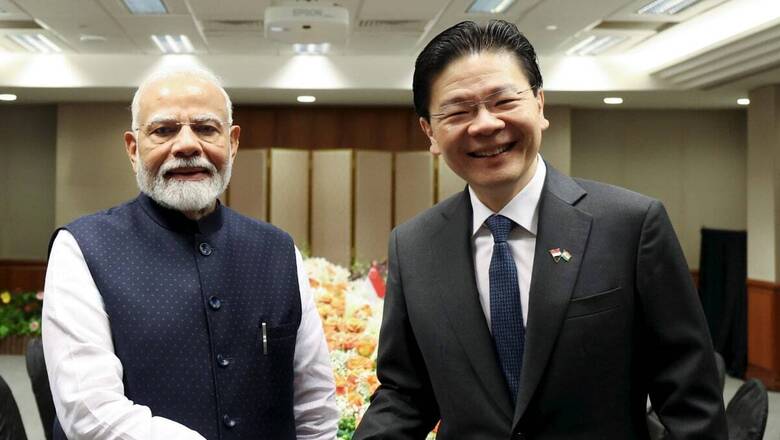
views
Lee Kuan Yew, the illustrious founding father of Singapore, who led his country from 1959 to 1990, expected a much bigger role for India in the ocean named after her. Lee’s admiration for Jawaharlal Nehru, India’s first prime minister, was profound. Yet Nehru was not ready to take on the mantle of regional leadership that Lee envisaged. Will Modi step up to the high table at last?
Nehru, one of the key architects of independent India, harboured lofty ideals and visions for our newly sovereign state. But his approach, as history shows us, was sadly mistaken. Pious and high-sounding principles, without corresponding military and economic power, only earn derision in the real world. Nehru’s failure in gauging China’s belligerence cost India its early opportunity of a Security Council membership. Something we have been trying to rectify for decades.
Nehru’s socialist and centralised model of economic planning, imitative of the Soviet Union, was also a disaster. The realities of post-colonial India, mired in poverty, social upheaval, combined with the enormous task of nation-building, quickly overshadowed his aspirations of global statesmanship for himself and an important role for India in the world. Instead, we had to go begging for food grains when the rains failed.
India’s policy of non-alignment, while morally uncompromising, often left it on the periphery of global power politics, especially in the backdrop of the Cold War era. Far from acting as the custodian of peace and the rule of law in the region, as the British Empire had before its departure, India soon grappled with immediate threats to its own territory and existence.
The assault by China in 1962 took India by surprise, leading to a humiliating setback and exposing India’s unpreparedness for assertive regional engagement. Additionally, contentious relations and ensuing wars with Pakistan further entangled India in subcontinental strife. In the subsequent decades, the country was also caught up in its own internal struggles against insurgency and inequality. Yet despite these hurdles, India continued to stride forward, albeit sometimes falteringly, driven by the persistence of its people and the resilience of its democracy.
Let us, albeit not in the way of a comparison, briefly review Singapore’s astonishing progress. The city-state, under Lee Kuan Yew’s stewardship, burgeoned into a powerhouse beyond anyone’s wildest predictions. Rooted in pragmatic governance, unwavering commitment to the rule of law, and an unyielding ethos of meritocracy, Singapore typified the economic miracle. The nation thrived, amassing wealth and establishing a standard of living that now exceeds that of most developed nations.
Singapore’s sovereign wealth funds exemplify its economic prowess and far-reaching financial clout, offering a fiscal reservoir so substantial that hypothetically, its citizens could afford to live without working for years. But such an imaginary scenario contrasts sharply with the reality of a populace known for its industriousness and efficiency. Singapore’s workforce, comprising both natives and foreigners, epitomises the nation’s meritocratic philosophy, together constituting the cogs and wheels of an economic juggernaut.
Singapore’s extraordinary success is multifold—its prominence as a centre for finance, business, trade, and education is complemented by its strategic function as a global oil refining hub and a respected tax haven. Cumulatively, these attributes elevate Singapore to a position of significant global influence, disproportionate to its geographic size.
Six decades after Nehru, is Modi, who aspires to be a greater prime minister than Nehru, going to step up to the high table? Modi’s eastern expedition, with a two-day official visit to Singapore on September 4-5, after a historic stop at Brunei, certainly signals India’s intention. In the Indian Ocean region, Modi is finally stepping up to a role bigger than any of his predecessors. A new nuclear submarine is one clear signal to the world that India means business. Apart from China, no one in the region has one. Earlier, at the other end of the Indian Ocean, India offered safe passage to ships under fire from Houthi fire and Somali pirates.
The Straits of Malacca are second only to the Gulf of Hormuz in terms of the world’s oil traffic. India is keen to enhance its presence in the region. When it comes to Singapore, it is not only India’s largest trading partner of the ASEAN countries, but a large portion of the Foreign Direct Investment into the country is routed via Singapore. In the last fifteen years, the amount is over a staggering $150 billion of which close to $12 billion came just last year, in 2023.
Modi is reinvigorating India’s regional aspirations and seeking to enhance its influence in the Indian Ocean sphere. Modi’s vision aligns closer to Lee’s proposition of a greater role for India as the balancing power in the region. India’s multilateralism is a perfect development of her earlier non-aligned stance. To pursue its own interests as also work for global peace, prosperity, rule of law, and security is India’s mission. And Modi is its able and enthusiastic ambassador.
The Singapore visit assumes added significance because it is among the first by any major power or partner after the recent swearing in of the island nation’s new prime minister, Lawrence Wong. Strengthening ties with Singapore is demonstrative of India’s commitment to expanding its foothold in the region. But more than that, Modi’s India is, in many ways, channeling a dynamism similar to what transformed Singapore, recognising the necessity to project strength and foster economic alliances.
The symbiotic journeys of India and Singapore illuminate contrasting paths of two democratic and multi-ethnic nations emerging from colonial shadows. In the contemporary era, India, under Modi’s lead, is aspirational yet again, revisiting the potential to assume a pivotal role in the region, a vision once imagined by Lee Kuan Yew. The strengthening of India-Singapore relations hints at a collaborative future, where Lee’s vision and Modi’s execution may yet converge, heralding a new chapter in the saga of the Indian Ocean region.
The writer is an author, columnist, and former Director, Indian Institute of Advanced Study. Views expressed in the above piece are personal and solely those of the author. They do not necessarily reflect News18’s views.




















Comments
0 comment